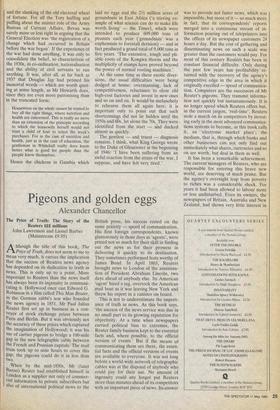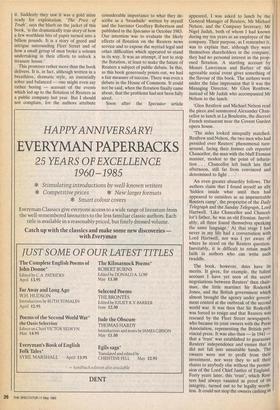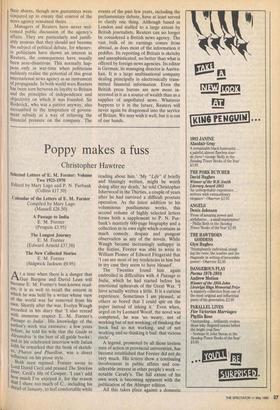Pigeons and golden eggs
Alexander Chancellor
The Price of Truth: The Story of the Reuters £££ millions John Lawrenson and Lionel Barber (Mainstream £9.95) A 'though the title of this book, The ..Price of Truth, does not seem to me to mean very much, it carries the implication that the success of Reuters news agency has depended on its dedication to truth in news. This is only up to a point. More Important to Reuters than the news itself has always been its ingenuity in communi- cating it. Hollywood once cast Edward G. Robinson in a film called This Man Reuter, as the German rabbi's son who founded the news agency in 1851. Mr Paul Julius Reuter first set up in business as a con- veyor of stock exchange prices between Paris and Berlin. But it was obviously not the accuracy of these prices which captured the imagination of Hollywood; it was his use of carrier pigeons to bridge a 100-mile gap in the new telegraphic cable between the French and Prussian capitals! The mail train took up to nine hours to cover this gap; the pigeons could do it in less than two.
When by the mid-1850s, Mr (later Baron) Reuter had established himself in London as a supplier not only of commer- cial information to private subscribers but also of international political news to the British press, his success rested on the same priority — speed of communication. His first foreign correspondents, known glamorously in those days as 'agents', were prized not so much for their skill in finding out the news as for their prowess in delivering it quickly to its destination. They sometimes performed feats worthy of James Bond. In April 1863, Reuters brought news to London of the assassina- tion of President Abraham Lincoln, two days ahead of anybody else. Its American 'agent' hired a tug, overtook the American mail boat as it was leaving New York and threw his report in a canister on board.
This is not to underestimate the import- ance of truth in news. As this book says, 'the success of the news service was due in no small part to its growing reputation for objectivity. At a time when newspapers carried political bias to extremes, the Reuter family business kept to the essential facts and, where possible, to the official version of events.' But if the means of communicating them are there, the essen- tial facts and the official versions of events are available to everyone. It was not long before a world-wide network of telegraphic cables was at the disposal of anybody who could pay for their use. No amount of ingenuity could any longer put Reuters more than minutes ahead of its competitors with an important piece of news. Its answer
was to provide not faster news, which was impossible, but more of it — so much more in fact, that its correspondents' reports merged into a continuous stream of in- formation pouring out of teleprinters into the offices of its newspaper customers 24 hours a day. But the cost of gathering and disseminating news on such a scale was greater than the customers would pay. For most of this century Reuters has been in constant financial difficulty. Only during the past few years has profitability re- turned with the recovery of the agency's competitive edge in the area in which it originally excelled — speed of communica- tion. Computers are the successors of Mr Reuter's pigeons. They transmit. informa- tion not quickly but instantaneously. It is no longer speed which Reuters offers but, in the current jargon, 'real-time'. Reuters stole a march on its competitors by invest- ing early in the most advanced communica- tions systems to become, as this book calls it, an 'electronic market place'; the medium, that is, through which banks and other businesses can not only find out immediately what shares, currencies and so on are worth, but deal in them as well.
It has been a remarkable achievement. The current managers of Reuters, who are responsible for entering this brave new world, are deserving of much praise. But the agency's overnight leap from poverty to riches was a considerable shock. For years it had been allowed to labour more or less undisturbed. Even its owners, the newspapers of Britain, Australia and New Zealand, had shown very little interest in
it. Suddenly they saw it was a gold mine ready for exploitation. The Price of Truth', says the blurb on the jacket of this book, 'is the dramatically true story of how a few worthless bits of paper turned into a billion pounds. It is a story of greed and intrigue surrounding Fleet Street and of how a small group of men broke a solemn undertaking in their efforts to unlock a treasure house.'
This promises rather more than the book delivers. It is, in fact, although written in a breathless, dramatic style, an essentially sober and balanced — one might even say rather boring — account of the events which led up to the flotation of Reuters as a public company last year. But I should not complain, for the authors attribute
considerable importance to what they de- scribe as a 'broadside' written by myself and the barrister Geoffrey Robertson and published in the Spectator in October 1983. Our intention was to evaluate the likely effects of flotation on the Reuters news service and to expose the myriad legal and other difficulties which appeared to stand in its way. It was an attempt, if not to stop the flotation, at least to make the future of Reuters a subject of public debate. In this, as this book generously points out, we had a fair measure of success. There was even a debate in the House of Commons. It could not be said, when the flotation finally came about, that the problems had not been fully aired.
Soon after the Spectator article
appeared, I was asked to lunch by the General Manager of Reuters, Mr Michael Nelson, and the Company Secretary, Mr Nigel Judah, both of whom I had known during my ten years as an employee of the company. Their purpose, as I remember it, was to explain that, although they were themselves shareholders in the company, they had no personal interest in the prop- osed flotation. A startling account by Messrs Lawrenson and Barber of this agreeable social event gives something of the flavour of this book. The authors were under the false impression that it was the Managing Director, Mr Glen Renfrew, instead of Mr Judah who accompanied Mr Nelson to the lunch.
'Glen Renfrew and Michael Nelson read the piece and summoned Alexander Chan- cellor to lunch at Le Boulestin, the discreet French restaurant near the Covent Garden opera house.
'The sides looked unequally matched. Renfrew and Nelson, the two men who had presided over Reuters' phenomenal turn- around, facing their former cub reporter Chancellor, the man with the bluff Etonian manner, modest to the point of infuria- tion . . . Chancellor left lunch late that afternoon, still far from convinced and determined to fight . .
An even greater absurdity follows. The authors claim that I found myself an ally 'hidden inside what until then had appeared to outsiders as an impenetrable Reuters camp', the proprietor of the Daily Telegraph and the Sunday Telegraph, Lord Hartwell. 'Like Chancellor and Chancel- lor's father, he was an old Etonian. Inevit- ably, all three found themselves speaking the same language.' At that stage I had never in my life had a conversation with Lord Hartwell, nor was I yet aware of where he stood on the Reuters question. Inevitably, it is difficult to retain much faith in authors who can write such twaddle.
The book, however, does have its merits. It gives, for example, the fullest account I have yet seen of the secret negotiations between Reuters' then chair- man, the little martinet Sir Roderick Jones, and the British government which almost brought the agency under govern- ment control at the outbreak of the second world war. It was then that Sir Roderick was forced to resign and that Reuters was rescued by the Fleet Street newspapers, who became its joint owners with the Press Association, representing the British pro- vincial press. It was also then — in 1941 — that a 'trust' was established to guarantee Reuters' independence and ensure that It did not fall into unsuitable hands. The owners were not to profit from their investment, nor were they to sell their shares to anybody else without the permis- sion of the Lord Chief Justice of England. Forty years later, this 'trust', which Reu- ters had always vaunted as proof of its integrity, turned out to be legally worth- less. It could not stop the owners cashing in
their shares, though new guarantees were conjured up to ensure that control of the news agency remained theirs.
Managers of Reuters have never wel- comed public discussion of the agency's affairs. They are particularly and justifi- ably anxious that they should not become the subject of political debate, for whenev- er politicians have shown an interest in Reuters, the consequences have usually been near-disastrous. This normally hap- pens only in war-time when politicians suddenly realise the potential of this great international news agency as an instrument of propaganda. In both world wars Reuters has been torn between its loyalty to Britain and the principles of independence and objectivity on which it was founded. Sir Roderick, who was a patriot anyway, also succumbed to the temptation of govern- ment subsidy as a way of relieving the financial pressure on the company. The
events of the past few years, including the parliamentary debate, have at least served to clarify one thing. Although based in London and staffed to a large extent by British journalists, Reuters can no longer be considered a British news agency. The vast bulk of its earnings comes from abroad, as does most of the information it peddles. Its reporting of Britain is sketchy and unsophisticated, no better than what is offered by foreign news agencies. Its editor is German; its managing director is Austra- lian. It is a large multinational company dealing principally in electronically trans- mitted financial information. Even the British press barons are now more in- terested in it as a source of wealth than as a supplier of unpolluted news. Whatever happens to it in the future, Reuters will never again be dragooned into the service of Britain. We may wish it well, but it is out of our hands.
















































 Previous page
Previous page